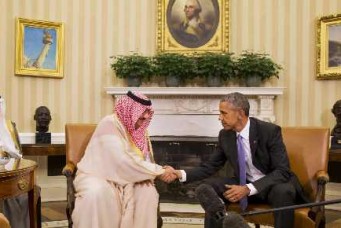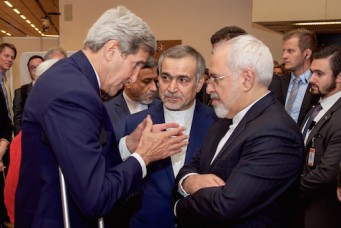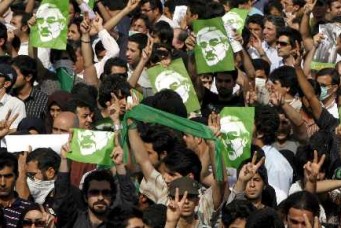The New Middle East, Iran Nuclear Deal and the Arabs
Nabil Fahmy says Arabs have to deal with the regional situation, including the Iranian deal, seriously and objectively. Simply making statements will not deter threats or safeguard interests. Egypt’s former foreign minister calls for independent and concrete Arab proposals.
In 2004, during my post as Egypt’s Ambassador to the United Sates, I received a call from the United States National Security Council (NSC) advisor, inviting Egypt to take part in a summit about a “greater” Middle East–one which includes the Arab states, and extends to Pakistan and Afghanistan. From our discussions I concluded that the Greater Middle East concept was based upon the belief that our countries were the source of terrorist threats to the U.S. and its allies, and that the traditional definition of the Middle East as the Arabs, Iran, and Israel didn’t fit the real situation or help solve the terrorist problems of the region. I spontaneously declined the invitation and said that Middle East as we know it is Arab in core, and includes Iran, Israel and possibly others. I also made it clear that adding the problems of Afghanistan and Pakistan would not stabilize the region or help solve any problems.
A few weeks ago, in spring 2015, an influential Iranian advisor close to the decision makers told me that Egypt was mistaken in believing that the Middle East was ever Arab in core. He also emphasized that in any case the new Middle East was totally different. And affirmed that the main identity of the citizens in the region was not Arab; that the Arab world was divided; and that the political, security, and economic weight of the region did definitely not favor the Arab world.
A greater Middle East in 2004, and a new Middle East in 2015… both non-Arab!
Was it a great conspiracy or simply a coincidence of interests?
I don’t believe it’s a great conspiracy, there was no dark held secret. In fact, most of the actions and policies were publicly pronounced and openly exercises. However, I don’t think it’s simply a matter of coincidence of interests either. There is significant evidence of double standards, undeclared communications, and surprising cooperation among–supposedly–disputing and polarizing parties. This extends far beyond the U.S. and Iran, to include Israel, Turkey, and even possibly some Arab states.
Conspiracy or a coincidence is not the paramount issue. Most importantly, we need to recognize that our Arab world is in danger. And it is imperative that we be honest with ourselves about the reasons. This embarks on a different approach in order to find a new way to protect ourselves and build a brighter future.
I strongly believe that stagnant political thought in the Arab world is a major albeit not exclusive reason for the current Arab predicament and malaise. Historically, Egypt had a pioneering role in developing Arab economic, social and political thought. Egypt was the bulwark of Arab nationalism. And along with six other Arab countries, it established the Arab League. However, Egypt and other Arab states couldn’t keep up with the changing world paradigm and were slow in developing Arab political, economic and social concepts that would continuously foster Arab nationalism and common interests.
The world community was divided after the Second World War into two camps: communist and capitalist, with some space for non-alignment over time. The bipolar system was ultimately dominated by the stronger pole. And now, we live in a multipolar world, where the American pole remains the most dominant.
Regretfully the Arab world has remained confined to the narratives of the great past: foreign conspiracy, reminiscing about the good old days of the Egypt-Syria-Saudi pillars, without nurturing new practical steps to strengthen common Arab interests, or supporting our national and regional capabilities. A new generation of Arabs came to political and economic power, who were focused more on domestic and subregional interests, and didn’t embrace Arab regional ones. One example of the malaise is that inter-Arab trade today is only 18 percent of Arab foreign trade, and 80 percent of that inter-Arab trade is limited to Gulf countries. Consequently, the scope of common Arab economic interests is shrinking.
The second major policy reason for the deteriorating Arab situation was overdependence on others, mostly foreign countries or institutions. The non-economic examples for this are many, including the Egyptian-Soviet relations in the 1960s, and Egyptian-U.S. relations in the last few decades. Many Arab states which have been through similar circumstances in the Levant with Syria, Jordan or the Arab Gulf. Overdependence on others with respect to issues of national security weakened the Arab capabilities in dealing with regional political and security issues. It’s not a coincidence that the crises in Libya, Syria and Yemen, the “Islamic State”, and the Arab-Israeli conflict are today all shepherded by the United Nations, the European Union, or the United States of America and not by the Arab world.
Unfortunately, the Arabs are still absent in their own regional issues. That was blatantly obvious in the negotiations for Iran’s nuclear deal, which didn’t involve any Arab parties. This was also clearly reflected in Arab public reactions, which ranged from intimidation about the possible drawbacks of the deal, the traditional official applause that did little to hide obvious concerns, procrastinating declarations about the intention to further study the articles of the deal (as if the basic structure was not already known), or superficially praising the deal in order not to anger the U.S.
Details aside, the basic trade-off in the deal was lengthening the breakout time, i.e. slowing down Iran’s ability to enrich weapons grade nuclear material. This would involve some restrictions on Iran’s nuclear program and inspection operations for fifteen years. In exchange economic, and other sanctions applied against Iran would be lifted. This means providing Iran economic relief and re-involving it in the international arena as a fully-functioning player.
The deal indicates that the international community recognized Iran’s nuclear capabilities, which were developed in spite of the imposed sanctions. It also indicated a widespread belief that Iran could develop substantive amounts of weapons grade material if left unchecked. On the Iranian side, the deal mirrors a belief that accepting these restrictions and international re-involvement are key to better economic and political performance, regardless of the temporary restrictions on its nuclear capabilities and its expanding weight in regional politics.
Accordingly, negotiating parties have reached what they respectively hoped for. For its limited objectives, technically, the deal is solid. The real issue is the absence of any sincere efforts to address the dangers of spreading nuclear weapons in the region. Any such efforts will not be fruitful if they didn’t deal with the Israeli nuclear program. The U.S. and most foreign countries do not intend to deal with the Israeli program. And that the Arab overdependence on the U.S. to ensure their security diminishes their political leverage. It was not a coincidence that the first stop in Ashton Carter’s, U.S. Secretary of Defense, tour in the region to reassure U.S. allies after the deal was Israel, followed only after Saudi Arabia and Jordan. Egypt was not scheduled in the tour, although it is leading the Arab League this year hence representing the Arab world, and despite the fact that Egypt and America are supposed to be cooperating in counter terrorism strategies in the Middle East.
We–Arabs–have to deal with our regional situation, including the Iranian deal, seriously and objectively. Simply making statements will not deter threats or safeguard interests. Substantive, objective, and concrete Arab proposals are called for. Anything less would be a dereliction of duty.
I believe that Iran is a great nation, and key player in the region. It has all the rights to benefit from the peaceful use of nuclear technology in accordance with international regulations. However, I also affirm openly and unwaveringly that the Arab world has the right to safeguard itself against all nuclear threats, including those of Israel. It is also understandable for Arabs to be concerned about Iran’s nuclear and regional politics, and to demand guarantees to build trust gradually whether for the Iranian nuclear program, or neighboring Gulf States.
I concretely propose the following:
- All Arab states should insist on their right in enriching uranium according to the international non-proliferation pact.
- As they do not all need reprocessing or enrichment facilities, the Arab world should establish a regional nuclear fuel bank in cooperation with the International Atomic Energy Agency. Egypt is logical host for this center for many considerations.
- Arab states should call for prohibiting any storage of weapons grade material and eliminating unsafeguarded weapons grade the regional stockpile, including that of Israel.
- The Arab world should increase its international efforts towards creating a non-nuclear zone in the Middle East, and insist that it be created before the end of the of Iran’s deal, even if this requires the involvement of the UN Security Council, which Egypt will join next year.
These proposals address the Iranian deal, but the Arab world has greater challenges to regain self-confidence and credibility with other players. In this regard, I supported the Egyptian military operation in Libya, and the Saudi-led alliance in Yemen, to assert ourselves nationally and regionally. However, this should be followed by political initiatives, as the military action is not an end in itself but a tool in the hands of decision makers for political gains.
Furthermore, Arab States should take the political initiative regionally, whether through Egypt as the current head of the Arab League, or in support of the United Nations envoy’s proposal in Libya and with Arab Gulf countries in support the UN’s envoy to Yemen.
It is also important to more clearly formulate the Arab stand regarding the situation in Syria, and proposed solutions. The debacle in Syria may ultimately lead to the fragmentation of the Arab world.
Needless to say, many of those proposals require intensive Arab discussion and active diplomacy. Hence, I also propose that Egypt host strategic, official dialogues with groups of Arab leaders, to address different issues, take precise steps, reach better Arab understanding, or even set criteria to deal with the Arab disputes on issues in general. These should be convened far from media, in an auspicious atmosphere for dialogue.
Among the priority issues for discussion are:
- Scenarios for the situation in Syria.
- Stability and security in Libya.
- Terrorism and extremism.
- Citizenship and eliminating sectarianism.
- Varying the sources of Arab weapons, and cooperation in supporting military industries.
- Relations with non-Arab, Middle Eastern countries, especially Iran and Turkey, followed by Israel.
There have been rumors recently about Iran’s intension to communicate more intensively with Gulf countries to reassure them about the nuclear deal. I hope to see these develop and contribute usefully. I suggest in this regard that Iran takes tangible security measure with its neighboring countries, to reflect its seriousness about establishing a national, non-sectarian- dialogue.
Whether what we are witnessing is a conspiracy or coincidence of interests, Arabs have no choice but increased development, hard work, greater self reliance and regional cooperation, adapting a multiple option national security paradigm and taking charge of their own political initiatives.
This article was originally published in Arabic by Al Ahram, 22 July, 2015:http://www.ahram.org.eg/NewsQ/415794.aspx
Nabil Fahmy, a former foreign minister of Egypt, is dean of the School of Global Affairs and Public Policy at the American University in Cairo.




